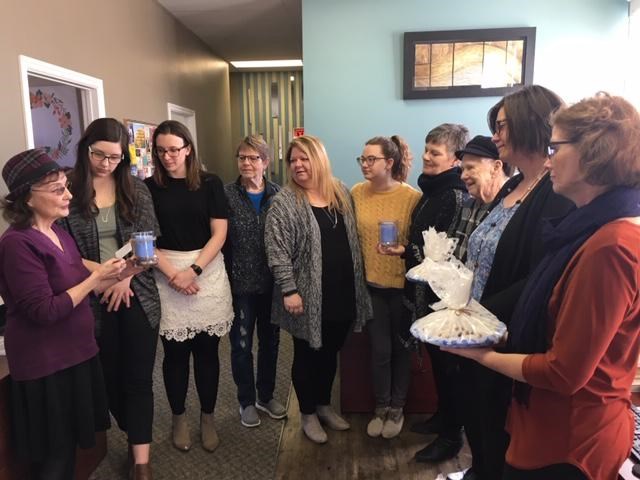Weyburn’s Quota Club has lost its international connection, but it will continue on as a local service organization for the city and area, members of the Weyburn Rotary Club were told in a presentation on Zoom on Thursday.
(The photos above show some of the donations Quota made last year, to the toy-lending library, Envision and the Salvation Army.)
Club member Heather Sidloski spoke about the continuing role of the Quota organization, with the Carol Festival presentation coming up on Sunday, Dec. 13 on AccessNOW TV, and the Rotary Music Festival and Women of the Year on for next year.
Quota International had a long history, starting in 1919 as a women’s version of the Kiwanis Club, as at that time women were not allowed to be members of the club.
The name Quota means “we share”, said Sidloski, noting it became the service club to help those who are deaf, hard-of-hearing, speech-impaired and disadvantaged women and children.
Due to the ongoing costs of operations, the Quota International organization based in Washington, D.C., disbanded, and the Weyburn chapter decided they wanted to carry on as a service organization, just removing the international component from their name.
“I think that’s very fitting, as most of our energies through the last number of years have been more local,” said Sidloski, noting the club wants to keep most of their local projects, with two main annual ones to continue: the Women of the Year Awards, and the Quota Carol Festival.
The Women of the Year have been ongoing for the last 20 years now, recognizing special women in the community in four categories: women in the workplace, women entrepreneurs, the community service award (named in honour of the late Isabelle Butters) and the Young Woman of Distinction.
“That main project is why a number of us have stayed in Quota,” said Sidloski, adding the other main project they wanted to continue with is the Carol Festival.
“The Carol Festival starts the Christmas season in Weyburn for many people. It really is a community event. Quota hosts it, but it really belongs to the community,” said Sidloski.
Asked about what might happen with the Music Festival, Sidloski said it hasn’t been finalized as yet, but there is a possibility being considered for a mix of in-person and virtual performances, unless the provincial health authorities dictate that no in-person performances can be held.
“Live performances have a special dimension that virtual doesn’t,” she said. “What it might look like might depend on having a limited audience, and we may have to do special distancing … as long as provincial health guidelines don’t completely shut us down.”
Some of the local groups that are supported by Quota include the Care-A-Van Society, a scholarship at the Weyburn Music Festival, a Southeast College scholarship, the toy-lending library at the Weyburn Public Library (in memory of former librarian and Quotarian, Marlene Yurkowski), as well as to groups like the Salvation Army, Weyburn Special Care Home, Envision Counselling, Tatagwa View, the Family Place and the Pioneer Woman statue project.
A large ongoing project is providing FM hearing systems to schools and for other facilities, which goes along with the Quota goal of helping hearing-impaired people to hear better.
Most of the classrooms in Weyburn’s schools have such a system now, and when the Weyburn Comprehensive School went to Grades 7 to 12, they donated 10 FM systems with the assistance of a bursary from the Saskatchewan Union of Nurses (SUN), said Sidloski.
“The teacher speaks into a necklace or microphone, and that sound is transmitted to the whole room, so if you’re sitting at the back of the room, you’re hearing the sound just as well as if you’re at the front of the room,” said Sidloski.
“With this pandemic, teachers are wearing masks and are finding it very difficult for kids to hear them, so they are really enjoying it. They don’t have to raise their voice and their voice doesn’t get distorted,” she added.
Prior to the pandemic, studies have shown around a quarter of the students in a classroom don’t hear the teacher properly because of colds or other factors, such as sitting in the back of the room.




